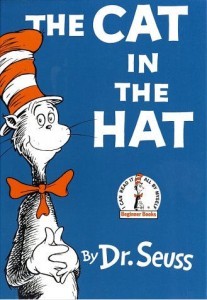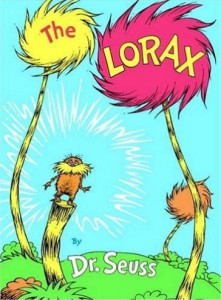 Well, it’s Theodore Geisel’s birthday again and with the movie release pending for The Lorax, it has me thinking once again about my childhood. Seuss’ The Cat In The Hat is one of the first books I ever remembering owning. I got it for my birthday as a young child. (I can’t remember which one my twin sister, Lara, got). I read that book ’til the cover fell off, over and over. I loved Seuss’ magic with words.
Well, it’s Theodore Geisel’s birthday again and with the movie release pending for The Lorax, it has me thinking once again about my childhood. Seuss’ The Cat In The Hat is one of the first books I ever remembering owning. I got it for my birthday as a young child. (I can’t remember which one my twin sister, Lara, got). I read that book ’til the cover fell off, over and over. I loved Seuss’ magic with words.
“The sun did not shine, it was too wet to play,” possibly the most well known opening line in twentieth century children’s publishing. Who could forget those words and what child couldn’t grasp the emotion behind them? Many a child had their days ruined by weather. No sand castle? No playing outside? No swingset? No bike? Sigh.
But as much as I loved The Cat In The Hat, I still remember The Lorax as my favorite. What I loved about The Lorax was the mystery of  the hand reaching from that perilous tower, and the young boy wanting to know more, as so many young boys do, who gets a tale of a lifetime. I was one of those kids: frustrating adults with all my questions. In many ways, I still tend to be. I’m always questioning “What if?” “Why?” etc. That’s probably why I went into writing science fiction and fantasy.
the hand reaching from that perilous tower, and the young boy wanting to know more, as so many young boys do, who gets a tale of a lifetime. I was one of those kids: frustrating adults with all my questions. In many ways, I still tend to be. I’m always questioning “What if?” “Why?” etc. That’s probably why I went into writing science fiction and fantasy.
But for me, The Lorax‘s message was so important. Despite being raised Conservative in a Christian and Republican home, the environment was something I always had a special relationship with. The Earth and nature resonate with me in a unique way. They inspire me, move me, touch me, and fill me with emotions at the experience of their beauty, aliveness, scents, smells, etc. I grew up in the farmlands of Kansas, far from the logging country of the Pacific Northwest, where that industry is such a part of the culture and economy that it’s iconic. I don’t think I saw my first logging truck into my teens or twenties. And it was on a trip somewhere, not around Salina where we lived. But one of my favorite singers, John Denver, sung a lot out the environment and I always found myself wondering why humans are so careless with the planet and land God gave us to live on. For me, it’s a no brainer. We need the Earth, the Earth doesn’t need us. We need the planets and animals and other ingredients in our food chain. We need the various products which give us quality of life. While they might not forage well, the cows and sheep and pigs probably wouldn’t mind if the slaughter houses shut down. And they probably wouldn’t get emotionally distraught at the disappearance of their farmer-owners. Just saying.
Seuss’ The Lorax taught a great lesson about how much our drive for more and more, whether it’s money or wood or anything else, leads humanity down dark and troublesome paths, with end results we should carefully consider. It taught lessons about respect for nature and the appreciation of the unknown. It reenforced my dad’s lessons about not being wasteful and about making full use of things as much as possible. From water to food, we were conservation minded at home. My dad installed  Naval shower heads to cut our water waste from long showers. So much so that it was a huge adjustment switching back to regular shower heads when I moved out on my own. He taught us to turn the water off after we got wet, apply soap and shampoo, then turn it on to rinse, then get out of the shower. No dilly dallying or long shower concerts for me, his wannabe rock star son. That stuff had to occur elsewhere. He taught us about composting everything from orange rinds to grass clippings, using toilet paper conservatively, and minimizing trash. To this day, my parents are lucky to fill a 15 gallon bag of trash in two months at their house. I have several trashcans, with specific ones devoted to aluminum, milk cartoons, hardboard, etc. And I make an extra run to the recycling center monthly, since the city offers no street pick up.
Naval shower heads to cut our water waste from long showers. So much so that it was a huge adjustment switching back to regular shower heads when I moved out on my own. He taught us to turn the water off after we got wet, apply soap and shampoo, then turn it on to rinse, then get out of the shower. No dilly dallying or long shower concerts for me, his wannabe rock star son. That stuff had to occur elsewhere. He taught us about composting everything from orange rinds to grass clippings, using toilet paper conservatively, and minimizing trash. To this day, my parents are lucky to fill a 15 gallon bag of trash in two months at their house. I have several trashcans, with specific ones devoted to aluminum, milk cartoons, hardboard, etc. And I make an extra run to the recycling center monthly, since the city offers no street pick up.
The Lorax reenforced these lessons and did it in a non-preachy, fun way. Like so much of Dr. Seuss’ work, it was simple, with basic vocabulary and stunning rhyme, yet at its heart lay an important lesson for us all. It saddens me a bit to see the Hollywoodization of The Lorax now which seems to contrary to the message. I haven’t even seen the movie yet but there are wasteful tie-ins of paper, plastic, etc. everywhere. How many of those will wind up enlarging our nation’s landfills or landfills around the world? Is that really what Dr. Seuss would have wanted? I doubt it.
But The Lorax is still in print and so we can do our part. We can buy the book for a child we know, and help them get a start. We can teach them of its wonders, of the lessons that it holds, and watch their eyes light up with magic at the beauty of its prose. We can share it with a stranger or a neighbor or a friend. We can share it with our grandkids or our children once again. For me, it’s really simple, and a thing I mustn’t dodge. For the lessons of The Lorax still are needed quite a lot.
Ok, I’m no Dr. Seuss, but I hope you get my point. For what it’s worth…
Happy Birthday, Dr. Seuss. May we honor you well. And thank you!

